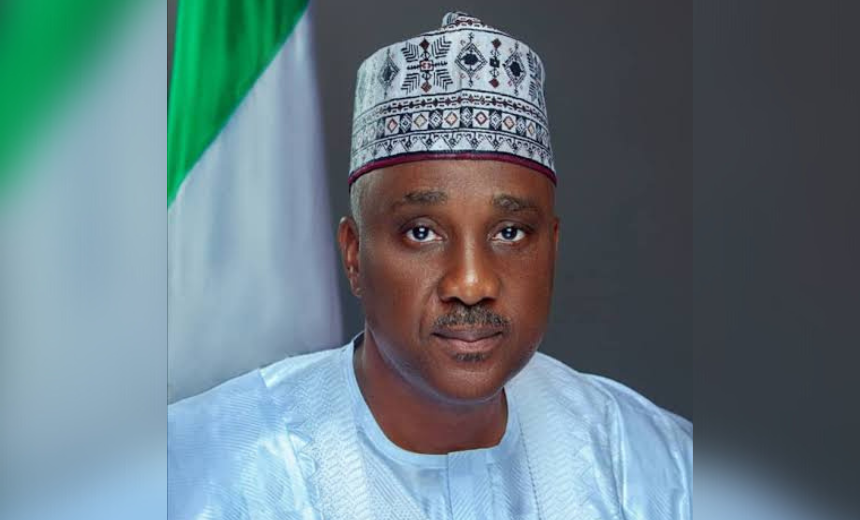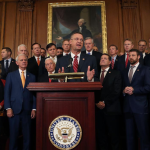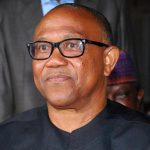Speaker of Nigeria’s House of Representatives, Tajudeen Abbas says lawmakers in the green chambers are considering reserving 10 percent of elective seats in the National Assembly for women and 5 percent for persons with disability in the ongoing constitution review process; a legislation that will add an another 82 members to the National Assembly with 55 members in the House and 28 in the senate.
Speaking at the second Legislative Open Week of the House, the Speaker noted that the reserved-seat representatives would enjoy the same rights, privileges, and committee assignments as other lawmakers, emphasising that their representation will not be different from their peers
On the ongoing constitutional review process, Abass revealed that 109 amendment bills across various sectors are up for consideration, including electoral, judicial, legislative, and inclusive governance.
A breakdown of these number of bills show that the twelve proposed electoral reform bills aim to address the scheduling of all general elections on a single day, establish independent candidacy, and create a dedicated commission for local government elections.
The 21 Judicial reform bills will help streamline appellate processes and strengthen judicial independence
Going further, the speaker described the reserved seats for women as a central feature of the House’s inclusive governance proposals, which will constitutionally guarantee adequate women representation and that of persons living with disabilities
According to him, the seats would be filled through direct elections on separate ballots, with staggered terms to promote continuity and mentorship. Five per cent (5%) of seats would be reserved for persons with disabilities, with candidates nominated by accredited disability advocacy organisations.
The Speaker also disclosed that the House has in its first two sessions introduced a total of 2,263 bills, with 1,478 going through Second Reading, 135 awaiting further consideration by the House and 339 pending before Standing Committees with five negatived, reflecting rigorous legislative debate.
Out of this number, 2,204 are member-sponsored bills, with 26 Executive bills and 33 emanating from the Senate for concurrence; a figure the speaker says indicates a steady upward trend since 1999 and highlights an ever-growing legislative capacity and competence
MUST READ:House of Reps Resumes Plenary, Disclose Plans To Resolve Rivers Crisis, Insecurity, others
Abass said as at 30 June 2025, the House has passed 237 bills and forwarded them for presidential assent, of which 55 have been signed into law, including the Tax Reform Laws, while 621 petitions have been received by the House from citizens on wrongful terminations, rights violations and other grievances, adding that 24 of the petitions have been fully treated, with reports ready, 30 dismissed for lack of merit while the remaining 567 are at various stages of the hearing and investigation process.
Speaker Abbas said the House will continue to advance security reform with bills for state policing and the devolution of powers over natural resources and infrastructure, adding that the House is considering 14 bills aimed at strengthening institutions, enforce fiscal accountability, and improve governance frameworks, alongside citizens’ rights feature in four human rights bills that align domestic law with international standards.
Speaking on Executive–legislature cooperation , the Speaker thanked the President for always consulting the National Assembly on key policy matters, and for respecting the input throughout the legislative process.
Abass acknowledged the challenges before Nigerians, promising that lawmakers will continue to balance fiscal realities in budget appropriations, prioritize critical sectors, and ensure that the House delivers fully on its legislative agenda.
Senate President, Senator Godswill Akpabio commended the House for itse achievements in the past two years.
He said plans are on to organize a joint open week with the Green chamber, describing the event as necessary to educate the Nigerian people on the functions of the lawmakers as a means of reducing the large turnover rate in the National Assembly, where in the Senate, about 80 percent of Senators are new to the parliament.
He said this huge turnover rate of lawmakers affects institutional memories in the legislature and even the effective performance of their functions.
Former House Speakers Yakubu Dogara and Patricia Etteh both charged the lawmakers to continue promoting the spirit of transparency and accountability, reminding the lawmakers of the need to constantly return to their constituencies to engage with the people as that is where their main office is and not in Abuja.
(Editor: Oloyede Oworu)








